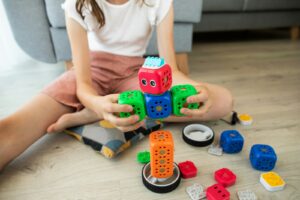Welcome to our article on educational toys for cognitive development! As parents, we all want to provide our children with the best tools to help them learn and grow. Educational toys are fun and engaging, stimulating a child’s mind and fostering problem-solving, creativity, and critical thinking development. This article will explore the benefits of educational toys and provide recommendations for different age groups. Join us as we help you navigate the world of educational toys to support your child’s cognitive development! Have you ever wondered how the toys we play with as children can significantly impact our cognitive development? From puzzles to building blocks, educational toys are crucial in shaping our minds and helping us learn new skills. This article will delve into the world of educational toys for cognitive development, exploring the different types available and how they can benefit us in various ways.
The Importance of Educational Toys
Educational toys are not just for fun—they are valuable tools that can enhance our cognitive abilities, stimulate our creativity, and promote problem-solving skills. Engaging with these toys can develop critical mental skills essential for success in school and beyond.
Stimulates Critical Thinking
One key benefit of educational toys is that they encourage us to think critically and solve problems fun and engagingly. Whether figuring out how to fit puzzle pieces together or building intricate structures with building blocks, these toys challenge our minds and help us develop analytical skills necessary for academic success.
Enhances Fine Motor Skills
Playing with educational toys also helps improve our fine motor skills, essential for writing, drawing, and using tools. By manipulating objects like beads, buttons, and blocks, we can strengthen the muscles in our hands and fingers, improving agility and coordination.
Types of Educational Toys
A wide variety of educational toys are available on the market, each designed to target specific areas of cognitive development. From toys that focus on spatial reasoning to those that enhance language skills, there is something every child can enjoy and benefit from.
Building Blocks
Building blocks are classic educational toys that have stood the test of time. Children can learn spatial reasoning, geometry, and engineering concepts by stacking and fitting blocks together. Building blocks encourage creativity and imagination as children construct unique structures and designs.
Puzzles
Puzzles are excellent toys for developing problem-solving skills and critical thinking. Whether a simple jigsaw puzzle or a more complex brain teaser, puzzles challenge children to think logically, make connections, and exercise their memory. Puzzles also help improve patience and perseverance as children work towards completing the puzzle.
STEM Toys
STEM toys focus on science, technology, engineering, and mathematics, providing children with hands-on experiences that promote learning in these areas. From robotics kits to coding games, STEM toys introduce children to real-world concepts and encourage them to explore and experiment. These toys are precious for developing analytical and logical thinking skills.
Arts and Crafts
Arts and crafts toys allow children to express their creativity and imagination through various mediums such as paint, clay, and crafting materials. Children can enhance their fine motor skills, creativity, and self-expression by engaging in artistic activities. Arts and crafts toys also help develop patience and attention to detail.
Choosing the Right Educational Toys
When selecting educational toys for cognitive development, it’s essential to consider the child’s age, interests, and developmental needs. Not all toys suit every child, so choosing toys that will challenge and engage them effectively is necessary.
Age-Appropriateness
It is a choice that is age-appropriate for the child’s developmental stage. Toys are crucial that are too advanced may frustrate the child, while toys that are too basic may not provide enough stimulation. Look for toys that align with the child’s cognitive abilities and interests.
Educational Value
Consider the toy’s educational value and how it can help promote cognitive development. Look for toys that target specific skills such as problem-solving, fine motor skills, critical thinking, or creativity. Toys that offer a variety of learning experiences are particularly beneficial for cognitive development.
Safety
Safety should always be a top priority when choosing educational toys for children. Ensure the toys are made from non-toxic materials, have no small parts that can be swallowed, and are durable enough to withstand play. Check for any age recommendations or warnings on the packaging to ensure the toy is safe for the child.
Educational Toys for Different Age Groups
Different age groups have varying cognitive abilities and developmental needs, so choosing appropriate educational toys for each childhood stage is essential. Here are some examples of educational toys for different age groups:
Infants and Toddlers (0-3 years)
Infants and toddlers benefit from toys that stimulate their senses, promote exploration, and encourage interaction. Look for toys that are brightly colored, have different textures, and produce sounds or music. Toys such as rattles, stacking cups, and soft books are excellent choices for this age group.
Preschoolers (3-5 years)
Preschoolers are curious learners who are eager to explore the world around them. Educational toys for this age group should focus on developing fine motor, language, and social skills. Toys such as play dough, shape sorters, and pretend play sets are perfect for preschoolers to engage with.
School-age children (6-12 years)
School-age children have more advanced cognitive abilities and can benefit from toys that challenge their critical thinking, creativity, and problem-solving skills. STEM toys, building sets, and art supplies are ideal for this age group as they provide hands-on learning experiences and promote independent thinking.
How Educational Toys Benefit Cognitive Development
Educational toys offer numerous benefits for cognitive development, helping children develop essential skills crucial for learning and academic success. Let’s explore how these toys can benefit cognitive development in various ways:
Promotes Problem-Solving Skills
Educational toys are designed to challenge children to think critically, problem-solve, and find solutions to complex tasks. Children learn to analyze information, make connections, and think creatively to overcome obstacles by engaging with these toys. This helps improve their problem-solving skills and prepares them for academic challenges.
Enhances Cognitive Abilities
Playing with educational toys stimulates various brain areas, including memory, attention, and spatial reasoning. By engaging in hands-on activities requiring concentration and focus, children can improve their cognitive abilities and overall brain function, leading to improved academic performance and mental development.
Fosters Creativity and Imagination
Educational toys allow children to express their creativity and imagination through open-ended play. Whether building elaborate structures with blocks or creating colorful artwork with craft supplies, these toys encourage children to think outside the box, experiment, and innovate. This fosters creativity and imagination, which are essential for problem-solving and innovation.
Encourages Social Interaction
Many educational toys are designed for collaborative play, encouraging children to interact, communicate, and collaborate with others. Children learn valuable social skills such as teamwork, cooperation, and communication by engaging in social play. This helps them develop strong interpersonal skills for building relationships and working effectively in groups.
In Conclusion
Educational toys play a vital role in cognitive development by stimulating critical thinking, enhancing fine motor skills, and promoting problem-solving abilities. By choosing suitable educational toys for children of different ages and interests, we can help them develop essential cognitive skills that will benefit them throughout their lives. So next time you shop for toys, consider their educational value and mental benefits—your child’s brain will thank you!



